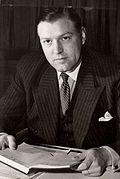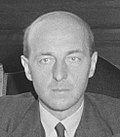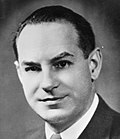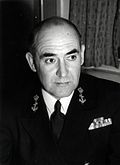First Drees cabinet
First Drees cabinet Second Drees cabinet | |
|---|---|
Cabinet of the Netherlands | |
  The first meeting of the First Drees cabinet at the Ministry of General Affairs on 14 March 1951 | |
| Date formed | 15 March 1951 |
| Date dissolved | 2 September 1952 1 year, 171 days in office (Demissionary from 25 June 1952) |
| People and organisations | |
| Monarch | Queen Juliana |
| Prime Minister | Willem Drees |
| Deputy Prime Minister | Frans Teulings |
| No. of ministers | 15 |
| Ministers removed | 2 |
| Total no. of members | 16 |
| Member party | Catholic People's Party (KVP) Labour Party (PvdA) Christian Historical Union (CHU) People's Party for Freedom and Democracy (VVD) |
| Status in legislature | Centre-left[1] Majority government (Grand coalition/Roman-Red) |
| History | |
| Outgoing election | 1952 election |
| Legislature terms | 1948–1952 |
| Incoming formation | 1948 formation |
| Outgoing formation | 1951 formation |
| Predecessor | Drees–Van Schaik cabinet |
| Successor | Second Drees cabinet |
| Part of the Politics series |
![Azure, billetty Or a lion with a coronet Or armed and langued Gules holding in his dexter paw a sword Argent hilted Or and in the sinister paw seven arrows Argent pointed and bound together Or. [The seven arrows stand for the seven provinces of the Union of Utrecht.] The shield is crowned with the (Dutch) royal crown and supported by two lions Or armed and langued gules. They stand on a scroll Azure with the text (Or) "Je Maintiendrai" (French for "I will maintain".)](http://upload.wikimedia.org/wikipedia/commons/thumb/8/8f/State_coat_of_arms_of_the_Netherlands.svg/150px-State_coat_of_arms_of_the_Netherlands.svg.png) |
|---|
|
|
The First Drees cabinet, also called the Second Drees cabinet[2] was the executive branch of the Dutch Government from 15 March 1951 until 2 September 1952. The cabinet was a continuation of the previous Drees–Van Schaik cabinet and was formed by the christian-democratic Catholic People's Party (KVP) and Christian Historical Union (CHU), the social-democratic Labour Party (PvdA) and the conservative-liberal People's Party for Freedom and Democracy (VVD) after the fall of the previous cabinet. The cabinet was a centrist grand coalition and had a substantial majority in the House of Representatives with Labour Leader Willem Drees serving as Prime Minister. Prominent Catholic politician Frans Teulings the Minister of the Interior in the previous cabinet served as Deputy Prime Minister and Minister without portfolio for the Interior.
The cabinet served during early years of the turbulent 1950s. Domestically the recovery and rebuilding following World War II continued with the assistance of the Marshall Plan, it also able to finalize several major social reforms to social security, welfare, child benefits and education from the previous cabinet. Internationally the decolonization of the Dutch East Indies following the Indonesian National Revolution continued, the European Coal and Steel Community was founded after the signing of the Treaty of Paris. The cabinet suffered no major internal and external conflicts and completed its entire term and was succeeded by the Second Drees cabinet following the election of 1952.[3]
Cabinet Members
[edit]- Resigned
- Retained from the previous cabinet
- Continued in the next cabinet
- Acting
- Ad Interim
- Died in Office
- Appointed as Special Representative of the World Bank
Trivia
[edit]- Nine cabinet members had previous experience as scholars and professors: Louis Beel (Administrative Law), Piet Lieftinck (Financial and Business Economics), Jan van den Brink (Public Economics and Economical Statistics), Dolf Joekes (Labour Law), Theo Rutten (Applied Psychology), Joris in 't Veld (Public Administration), Guus Albregts (International Economics), Piet Muntendam (Social Medicine) and Aat van Rhijn (Fiscal Law).
References
[edit]- ^ Changing Liaisons The Dynamics of Social Partnership in 20th Century West-European DemocraciesBy Karel Davids, 2007, P.165
- ^ According to a different numbering this was the Second Drees cabinet because it was the second cabinet with Willem Drees as Prime Minister, after the Drees–Van Schaik cabinet.
- ^ "Coalities tussen sociaaldemocraten en confessionelen" (in Dutch). Historisch Nieuwsblad. 10 August 2006. Retrieved 24 April 2018.
External links
[edit]- Official
- (in Dutch) Kabinet-Drees II Parlement & Politiek
- (in Dutch) Kabinet-Drees I Rijksoverheid























